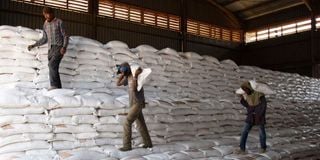Premium
Win for farmers as MPs add Sh4bn for fertiliser subsidy

Workers arrange bags of subsidised fertiliser at the National Cereals and Produce Board depot in Elburgon, Nakuru County. MPs have proposed an additional Sh4 billion for buying cheap fertiliser in the 2023-2024 financial year, raising the total allocation to Sh8.5 billion as part of the Kenya Kwanza administration’s efforts to reduce the high cost of living.
MPs have proposed an additional Sh4 billion for buying cheap fertiliser in the 2023-2024 financial year, raising the total allocation to Sh8.5 billion as part of the Kenya Kwanza administration’s efforts to reduce the high cost of living.
The National Assembly’s Budget and Appropriations Committee (BAC), in its recommendations to the House on the budget, proposed the increased allocation that will come as a boost to President William Ruto’s plan to boost food production.
However, the allocation is still lower than the Sh13.3 billion that the fertiliser subsidy programme allocated in the current financial year.
The government is providing subsidised fertiliser to farmers in 12 counties that produce most of the country’s maize and other staple foods. The input is being offered at Sh3,500, nearly half the price available in the open market.
“The government, working with the private sector, has also made arrangements to make another six million bags of various types of fertiliser available for the long rains season,” said the National Treasury in the 2023 Budget Policy Statement.
Retained fertiliser subsidies
At the beginning of the 2022-2023 financial year, the government removed fuel and maize subsidies but retained fertiliser subsidies to reduce the cost of production.
Safaricom has been tapped to provide the platform for the subsidy programme, allowing more than 10 million farmers to use the telco’s platform.
E-subsidy is an electronic vouchering solution that makes use of data and Short Message Service (SMS) to manage the issuing, redemption and reconciliation of vouchers on behalf of the Ministry of Agriculture. Under the system, farmers were issued e-vouchers through their mobile phones after validation by extension officers.
Former President Uhuru Kenyatta’s administration stopped the fertiliser subsidy programme ran under the National Cereals and Produce Board three years ago in favour of the e-voucher programme.





